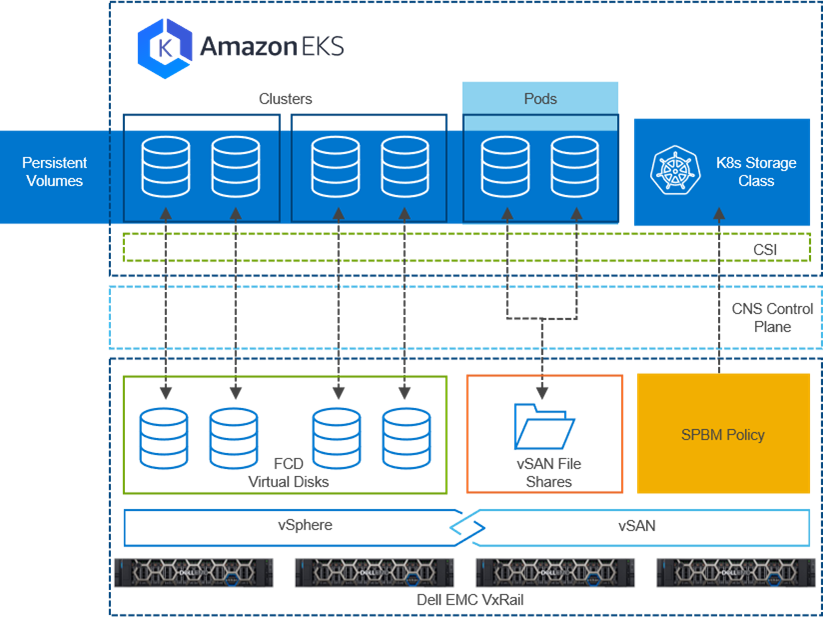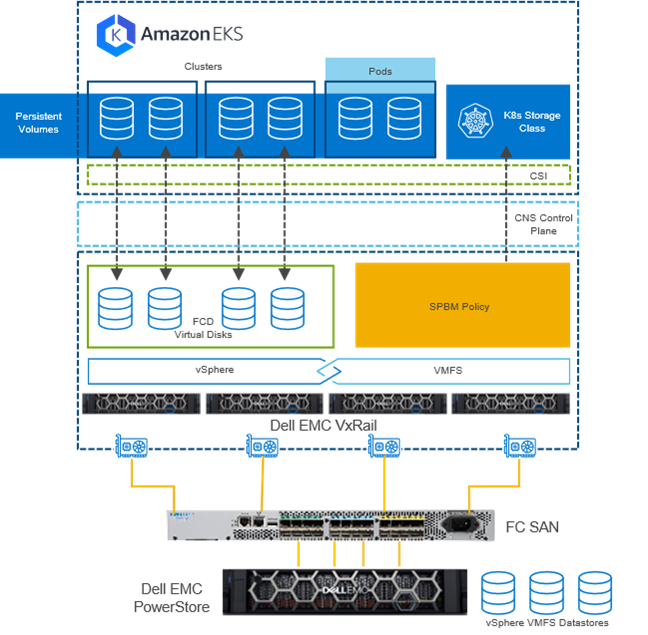In 2021 AWS and Dell Technologies announced that Amazon EKS Anywhere has been validated on Dell EMC VxRail Hyperconverged Infrastructure (HCI) and Dell EMC PowerStore storage systems. Now Amazon EKS Anywhere can run smoothly on Dell devices.
Amazon EKS Anywhere is a new deployment method of Amazon EKS, which is intended to allow customers to easily establish and execute Kubernetes Cluster within the on-premise infrastructure or public cloud environment.
Dell and AWS have a long history of business ecosystem cooperation, and they are committed to building a multi-cloud environment, so that enterprises can correctly place their data or applications in the most suitable infrastructure, on cloud or on-premises.
Deployment of Amazon EKS Anywhere on infrastructure products such as Dell's Hyperconverged Infrastructure (HCI) or storage systems allows enterprises to more easily build and manage their internal Kubernetes Clusters, which is great significance for simplifying the development and deployment of containerized applications.
Almost all enterprise IT organizations, across all industries, are shifting to a more developer-oriented model, and at the same time, there is a greater need for automated processes, rapid resource delivery, and highly reliable infrastructure support. In order to simplify the operation of the Kubernetes Container Orchestrator, Amazon EKS Anywhere provides automated Cluster management, help enterprises to reduce support costs and do not need to enable multiple open source or third-party tools to operate Kubernetes Cluster; On the one hand, Dell's infrastructure products are also continuously improving their automation capabilities, which not only simplifies the complexity of IT operations, but also claims to reduce downtime by 92% and increase the operational efficiency of the IT infrastructure team by more than 68%.
Through the combination of automatic Kubernetes Cluster management and intelligent and automated infrastructure, it is like creating a big picture for enterprise IT, which not only accelerates the realization of Infrastructure as Code (IaC), but also enables the DevOps team to become the innovation engine of enterprise business. ;
The scope of the integration of AWS and Dell also covers the certification of VxRail HCI system configuration. The strength of VxRail lies in its unique VxRail HCI system software, which provides end-to-end coordination and automation for all daily IT operations, as well as a single-click, complete HCI lifecycle management mechanism, which greatly increases the user's operational convenience. It's a huge boon now that enterprises can further leverage their existing VxRail deployments to easily execute traditional and cloud-native applications, completely eliminating the possibility of DevOps islands.
It is reported that VxRail is the only HCI system on the market so far jointly designed by VMware, which mainly uses VMware vSphere to execute Kubernetes Cluster based on virtual machines. AWS EKS Anywhere nowadays has been verified on VxRail with vSAN Persistent Block and file storage, proving that VxRail dynamic nodes can pass the verification and can use Dell EMC PowerStore all-flash storage devices for Persistent Block storage, fully demonstrating the flexibility of Amazon EKS managed services.

Figure 1: Amazon EKS Anywhere uses vSAN on Dell EMC VxRail Cluster for block and file storage. A VxRail setup with vSAN included to store vSAN blocks and file shares on First Class Disks (FCD).

Figure 2: Amazon EKS Anywhere uses PowerStore for block storage on a Dell EMC VxRail dynamic node cluster. VxRail dynamic nodes and PowerStore settings are deployed to VMFS datasets consisting of PowerStore Block Storage Volumes using First Class Disks (FCD).
Looking at these two proven infrastructure configurations, both use VMware cloud-native storage and corresponding Kubernetes CSI. Enterprise DevOps and platform teams can leverage CSI to provide EKS Anywhere Persistence dynamic and auto-configuration capabilities through native Kubernetes APIs for IaC operations. This enables VMware cloud-native storage in vSphere and vSAN to use the same storage operating model as cloud-native, supporting any version of Vanilla Kubernetes; that is, in both VxRail configurations, the enterprise's DevOps and platform teams can operate with a consistent user experience.
In conclusion, the deep cooperation between Dell and AWS has greatly strengthened the integration of enterprise internal infrastructure and Kubernetes Orchestration, thus enabling enterprises to seamlessly execute their Kubernetes Orchestration on the AWS cloud or within the enterprise through a single console of Amazon EKS Anywhere , there is no obstacle between the cloud and on-premises.